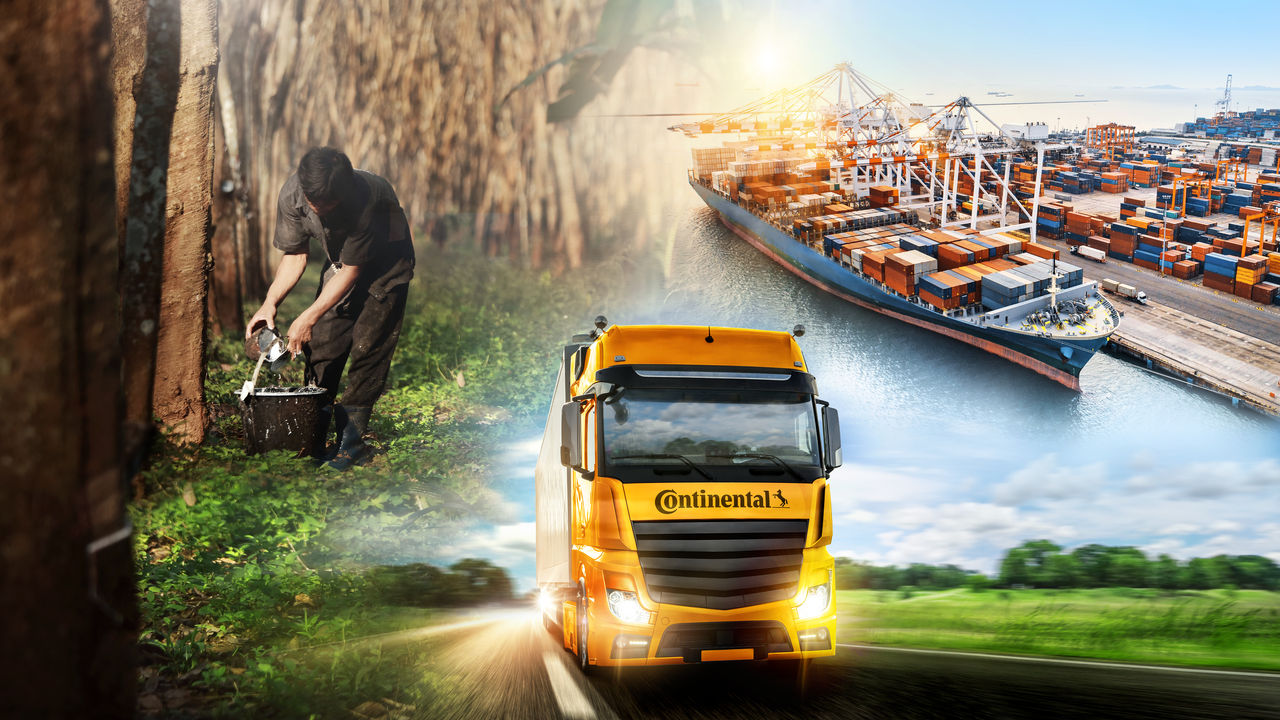
Visit Continental Tires in your country for local vehicle fitment
# Business Know-How
EUDR and the Fight Against Deforestation
What You Need to Know about the European Union Deforestation Regulation (EUDR)
All together against global deforestation
The European Union Deforestation Regulation (EUDR), adopted in 2023, aims to combat global deforestation driven by EU consumption. Continental has long been actively committed to greater transparency and sustainability along its supply chains. Therefore, we expressly support the EUDR, which now makes these efforts equally binding for all market participants.
EUDR regulation requires companies to ensure that affected products placed on or exported from the EU market — such as palm oil, soy, coffee, cocoa, rubber, and wood or their derivatives — are not linked to deforestation or forest degradation. By promoting sustainable supply chains, EUDR also underpins the European union's efforts to bring down greenhouse gas emissions and biodiversity loss.
Once entered into force, businesses must adhere to certain due diligence standards. Producers, manufacturers and processors are required to trace their raw materials back to deforestation-free sources and have a responsibility that certain environmental and human rights standards are being met. Bringing non-compliant products onto the market may incur fines up to 4% of annual turnover in the EU, or even temporary market exclusion.

If a company places a relevant commodity or product on the market or exports such, it is considered an operator under the EUDR. An operator can be the company that harvests natural rubber and then sells it, but an operator can also be the company that processes natural rubber and then sells a relevant product (e.g. tires) and places this product for the first time on the market.
If a company makes a product available on the market in the course of a commercial activity without being an operator it is considered a trader under the EUDR.
Natural rubber farms are mapped and their geolocation is assessed to ensure deforestation-free status. With this information, the due diligence obligations can be performed and the natural rubber can be imported and placed in the market in the EU Member States. The same procedure is applicable for the import of already produced tires, the natural rubber used needs to be assessed and the due diligences obligations performed.

All traders, regardless of size, must comply with EUDR regulation by following certain traceability procedures in order to prove that no deforestation activities have taken place.
For traceability purposes, traders need to register in the EU TRACES system and document the flow of goods (procurement and sales) in their own ERP system.
It is not necessary to submit their own Due Diligence Statements (DDS) to the EU.
More information can be found here: Deforestation Regulation implementation - Green Forum - European Commission
Continental has already undertaken considerable efforts and investments to adapt systems, internal processes, and supply chains to ensure compliance with EUDR from Day One.
As soon as EUDR-reporting requirements become applicable, Continental will automatically issue Due Diligence Statements (DDS) confirming the EUDR compliance of all relevant tires.
- Deforestation-Free
- Due Diligence Statements (DDS)
- Legal Right of Property
- Human Rights & Child Labour
Any product or production must be free from deforestation or forest degradation, regardless of whether the deforestation or forest degradation was legal according to the appicable legislation in the country of production.
DDS include geo-coordinates for individual former plots (up to 6 million smallholders), conducting due diligence checks for each plot, implementing satellite monitoring and ensuring chain custody for product delveries.
Any product or production occured must be in accordance with the relevant legislation of the country where the production took place.
Respect of human rights and no acceptance of child labour without compromise.
Please visit the website of the European Commission under:
Regulation on Deforestation-free products - European Commission
Deforestation Regulation implementation - European Commission
Continental pursues a holistic approach to make the complex and fragmented supply chains for natural rubber more sustainable: The latest digital technologies, local involvement in the cultivation of rubber, and close cooperation with strong partners are aimed at creating more transparency along the entire value chain.
For more info, please visit our website about Responsible Value Chain.
For Continental, acting in a sustainable and responsible way comprises respecting the law, conserving natural resources, and promoting climate and environmental protection, while also fulfilling our responsibilities towards our employees, partners, suppliers, customers, and society. We strongly support the vision laid out by the Sustainable Development Goals (SDGs) of the United Nations, with a key focus on the primary goals described below through the Continental Natural Rubber Sustainable Sourcing Policy and the natural rubber supply chain.
Our Natural Rubber Sustainable Sourcing Policy can be accessed here.
Despite careful research, we cannot guarantee that the information is correct and complete.
Related content
-
 2025/12/08In numerous projects, we are committed to responsible and fair sourcing along the entire value chain.Responsible Value ChainRead more
2025/12/08In numerous projects, we are committed to responsible and fair sourcing along the entire value chain.Responsible Value ChainRead more -
 2025/06/11We will make all our tires exclusively from sustainable materials by 2050. Find out what we are doing to achieve this goal.SustainabilityRead more
2025/06/11We will make all our tires exclusively from sustainable materials by 2050. Find out what we are doing to achieve this goal.SustainabilityRead more -
 2025/01/31Leading the way towards a greener future for the transportation business.EUTaxonomyRead more
2025/01/31Leading the way towards a greener future for the transportation business.EUTaxonomyRead more